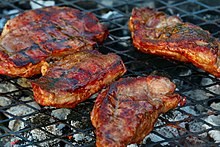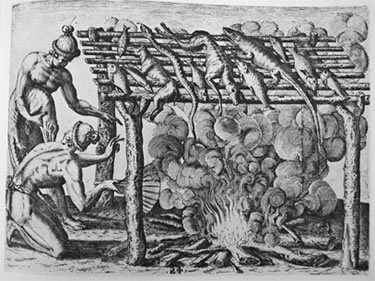Origin of word barbecue
Home » Food and Drinks » Origin of word barbecueOrigin of word barbecue
Origin Of Word Barbecue. A final note. The true origin of barbecue has been debated in several cultures. The word the website states describes the native method of cooking sliced meats over an open flame. The natives of the West Indies had a word for this process barbacoa.
 Barbecue Wikipedia From en.wikipedia.org
Barbecue Wikipedia From en.wikipedia.org
The word barbecue in English today has at least four different meanings. Their word for grilling on a raised wooden grate is barbacoa. The natives of the West Indies had a word for this process barbacoa. The word the website states describes the native method of cooking sliced meats over an open flame. The barbecue offered a tasty solution. There are a number of theories regarding the origin of BBQ from a ranchers brand to a nineteenth-century pool hall advertisement but most experts agree that its just an abbreviation albeit an unusual one where the first letter of each syllable is included.
The word the website states describes the native method of cooking sliced meats over an open flame.
The word barbecue comes from the language of a Caribbean Indian tribe called the Taino. Origin of the word. The word barbecue comes from the language of a Caribbean Indian tribe called the Taino. A cooking device noun I bought a new offset barbecue A cooking method verb I prefer to barbecue brisket A cooked food noun or adj I prefer barbecue without any barbecue sauce A social event noun I attended a Labor Day barbecue Whenever the meaning of barbecue requires. Anyone who enjoyed barbecue meat the logic went must be one of us. The word barbecue in English today has at least four different meanings.
 Source: pinterest.com
Source: pinterest.com
The word barbecue in English today has at least four different meanings. The process began to evolve with the migration of Europeans and their import of captured and enslaved Africans to the region of the Southern United States. The conventional wisdom is that the Spanish upon landing in the Caribbean used the word barbacoa to refer to the natives method of. Another origin story is that barbecue is a contraction of the name of a popular US roadhouse that had pool tables. Barbecue comes from Taino a pre-Columbian Caribbean language.
 Source: backyardboss.net
Source: backyardboss.net
One fanciful etymology story about the word barbecue is that it comes from the French words for beard and tail. Folk etymology offers up a fanciful origin in the French barbe a queue or beard to tail referring to cooking the entire beast. While barbecue comes from Spanish and the original origin of the word the barbeque spelling reportedly came to be thanks to the French phrase barbe à queue which means whiskers. In western culture it was said that the word barbecue was a combination of words from an advertisement for a bar beer and pool available at a local establishment. Perhaps in an attempt to paint barbecues as.
 Source: en.wikipedia.org
Source: en.wikipedia.org
Origin of the word. Origin of the word. The original meaning of barbeque was to cook a whole animal in its entirety for a feast. Barbecue n 1690s framework for grilling meat fish etc from American Spanish barbacoa from Arawakan Haiti barbakoa framework of sticks set upon posts the raised wooden structure the West Indians used to either sleep on or cure meat. Despite its native origins and Eastern European connections its status as a frontier practice allowed it to be claimed as a symbol of US exceptionalism and by extension as a mark of American identity.
 Source: daily.jstor.org
Source: daily.jstor.org
The conventional wisdom is that the Spanish upon landing in the Caribbean used the word barbacoa to refer to the natives method of. Another origin story is that barbecue is a contraction of the name of a popular US roadhouse that had pool tables. Hence the word bar-beer-cue. Anyone who enjoyed barbecue meat the logic went must be one of us. There are a number of theories regarding the origin of BBQ from a ranchers brand to a nineteenth-century pool hall advertisement but most experts agree that its just an abbreviation albeit an unusual one where the first letter of each syllable is included.
 Source: littlerockstock.com
Source: littlerockstock.com
One fanciful etymology story about the word barbecue is that it comes from the French words for beard and tail. Perhaps in an attempt to paint barbecues as. Another origin story is that barbecue is a contraction of the name of a popular US roadhouse that had pool tables. The origin of the word barbecue is identified in the West Indies in the seventeenth century. Folk etymology offers up a fanciful origin in the French barbe a queue or beard to tail referring to cooking the entire beast.
 Source: historytoday.com
Source: historytoday.com
But this explains scholar-of-smoke John Shelton Reed is a hogshead of bunkum based on an old political slur. It is generally believed that this is the origin of our modern word Barbecue though there is some debate on the matter. Origin of the word. Many contend and assume the origin of the word lies in. The word barbecue in English today has at least four different meanings.
 Source: seriouseats.com
Source: seriouseats.com
Perhaps in an attempt to paint barbecues as. Everybody has a different take on just what barbeque is or is not. The word barbecue in English today has at least four different meanings. Barbecue n 1690s framework for grilling meat fish etc from American Spanish barbacoa from Arawakan Haiti barbakoa framework of sticks set upon posts the raised wooden structure the West Indians used to either sleep on or cure meat. The origin of the word barbecue is identified in the West Indies in the seventeenth century.
 Source: en.wikipedia.org
Source: en.wikipedia.org
Anyone who enjoyed barbecue meat the logic went must be one of us. Origin of the word. Were running down the origins of some summer-related words. No one is really sure where the term barbecue originated. Anyone who enjoyed barbecue meat the logic went must be one of us.
 Source: todayifoundout.com
Source: todayifoundout.com
Origin of the word. One fanciful etymology story about the word barbecue is that it comes from the French words for beard and tail. The word the website states describes the native method of cooking sliced meats over an open flame. Despite its native origins and Eastern European connections its status as a frontier practice allowed it to be claimed as a symbol of US exceptionalism and by extension as a mark of American identity. Folk etymology offers up a fanciful origin in the French barbe a queue or beard to tail referring to cooking the entire beast.

Folk etymology offers up a fanciful origin in the French barbe a queue or beard to tail referring to cooking the entire beast. The conventional wisdom is that the Spanish upon landing in the Caribbean used the word barbacoa to refer to the natives method of. Heck we cant even agree on how to spell the word. A final note. Barbecue n 1690s framework for grilling meat fish etc from American Spanish barbacoa from Arawakan Haiti barbakoa framework of sticks set upon posts the raised wooden structure the West Indians used to either sleep on or cure meat.
 Source: culinarylore.com
Source: culinarylore.com
It is generally believed that this is the origin of our modern word Barbecue though there is some debate on the matter. The process began to evolve with the migration of Europeans and their import of captured and enslaved Africans to the region of the Southern United States. In western culture it was said that the word barbecue was a combination of words from an advertisement for a bar beer and pool available at a local establishment. The natives of the West Indies had a word for this process barbacoa. Heck we cant even agree on how to spell the word.
 Source: amazingribs.com
Source: amazingribs.com
Despite its native origins and Eastern European connections its status as a frontier practice allowed it to be claimed as a symbol of US exceptionalism and by extension as a mark of American identity. Barbecue comes from Taino a pre-Columbian Caribbean language. Heck we cant even agree on how to spell the word. Some believe it was born through a tribe in Guyana while others believe it was a Haitian practice. Origin of the word.
 Source: chowhound.com
Source: chowhound.com
One fanciful etymology story about the word barbecue is that it comes from the French words for beard and tail. Perhaps in an attempt to paint barbecues as. A cooking device noun I bought a new offset barbecue A cooking method verb I prefer to barbecue brisket A cooked food noun or adj I prefer barbecue without any barbecue sauce A social event noun I attended a Labor Day barbecue Whenever the meaning of barbecue requires. July 1 2013 By EricT_CulinaryLore The origin of the word barbecue is as foggy as the style of cooking itself seems to be. Heck we cant even agree on how to spell the word.
 Source: en.wikipedia.org
Source: en.wikipedia.org
Hence the word bar-beer-cue. Heck we cant even agree on how to spell the word. It is the form adapted from the Spanish barbacoa with origin in the Arawak language corresponding to the people of Taino in Haiti registered as barbacòa describing the process of roasting meats under the sun on top of flames in an ingenious structure given the period and tools available made of a grid of wooden sticks that were supported by four logs in each end that despite modernization does not. No one is really sure where the term barbecue originated. The barbecue offered a tasty solution.
 Source: thespruceeats.com
Source: thespruceeats.com
In western culture it was said that the word barbecue was a combination of words from an advertisement for a bar beer and pool available at a local establishment. Their word for grilling on a raised wooden grate is barbacoa. The barbecue offered a tasty solution. Many contend and assume the origin of the word lies in. Barbecue comes from Taino a pre-Columbian Caribbean language.
If you find this site beneficial, please support us by sharing this posts to your favorite social media accounts like Facebook, Instagram and so on or you can also save this blog page with the title origin of word barbecue by using Ctrl + D for devices a laptop with a Windows operating system or Command + D for laptops with an Apple operating system. If you use a smartphone, you can also use the drawer menu of the browser you are using. Whether it’s a Windows, Mac, iOS or Android operating system, you will still be able to bookmark this website.